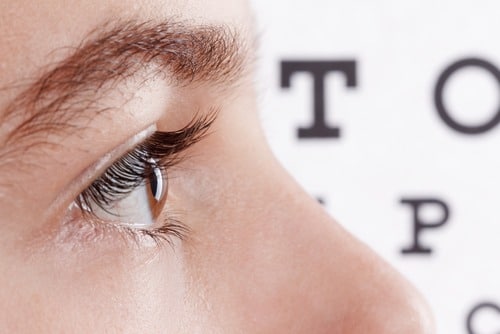Pediatric Vision Therapy: Is it Right for My Child?
When glasses, contacts or surgery can’t treat a vision condition alone, pediatric vision therapy may be effective. Learn more & discover expert vision therapy near Columbus, Ohio.
Pediatric Vision Therapy: Is it Right for My Child?
As a parent, you have the ability to zero-in and understand what your child needs or wants almost immediately. Quickly recognizing their emotions, demeanor, abilities, and desires is what makes you their everything and ultimate advocate.
Still, with as fast as children grow and develop, there is one area that even the most observant parent may not notice an issue looming in – their child’s vision.
A Struggling Visual System in a Child is Hard to Spot
If your child has a struggling visual system, it can be hard for you to spot because your child may not even know he or she is contending with a vision problem. If they don’t sense something is wrong, how can they communicate signs or concerns to you?
Or, perhaps you’ve noticed a shift in your child’s behavior and learning abilities/attitude. It’s absolutely normal for most parents to attribute these issues with a multitude of other things before considering if their child’s vision is the culprit.
When it comes to your child’s vision, we take the care and keeping of their healthy vision very seriously.
Whether they may need glasses, vision therapy, or a combination of both to help address and correct their vision and learning/behavioral problems, we’re here to break it all down for you:
What is Pediatric Vision Therapy?
Pediatric vision therapy is a non-surgical, therapeutic program where an optometrist works with your son or daughter on various visual activities that are specifically designed to strengthen their visual system and teach it to correct its impairments.
Think of pediatric vision therapy as physical therapy for the eyes – an alternative route for treating certain vision conditions that glasses, contacts or surgery can’t treat alone.
Discover a highly-effective pediatric vision therapy program in near Columbus Ohio:
The Best Approach to Vision Therapy Games for Children
It is the goal of pediatric vision therapy to help each patient achieve clear binocular vision in a fun and comfortable way.
The best vision therapy games and exercises for children:
- Are always customized to fit a child’s exact vision needs
- Involve both the eyes and the parts of the brain that control vision
- Include prisms, filters, lenses, and computer-assisted activities
- Utilize balance metronomes, boards and non-computerized visual instruments when needed
- Require active participation from all team members to be successful and effective, including: doctor, patient, child’s parents and, when necessary, vision therapist
Problems Vision Therapy Can Correct
When it’s determined that glasses, contacts or surgery can’t treat a certain vision issue, vision therapy can prove effective.
Vision therapy mainly works to correct:
Think your child would benefit from vision therapy? Schedule an appointment with a team that specializes in pediatric vision therapy near Columbus, Ohio:
What Vision Therapy Isn’t
With so many self-help vision improvement programs and courses available today – which can be found through TV advertisements and Google searches – it’s important to not confuse vision therapy for a self-run program that has you perform a series of eye exercises (and may even claim you can throw away your eyeglasses).
No such program you find on TV or the Internet are endorsed by professional eye care organizations. Additionally, there is no scientific evidence that self-help programs of eye exercises can correct eye issues or reverse nearsightedness or other refractive errors.
Vision Therapy & Learning and Behavioral Difficulties
Because vision is the primary sense by which we learn, it’s incredibly common for a child with a learning or behavioral difficulty to also have an underlying, undiagnosed vision problem that is contributing to their learning/behavioral problems.
Most optometrists use vision therapy as a piece in a multidisciplinary approach in the treatment of varying degrees of learning difficulties.
10 Signs Your Child May Benefit from Vision Therapy
If your child is displaying one or more of these signs, don’t negate the possibility that the issue(s) could be caused – to some degree – by an unidentified vision issue:
- Difficulty in school despite passing an eye screening
- Attention issues/difficulty concentrating
- Poor reading skills/covering one eye when reading
- Avoidance of reading or school work
- Poor grades despite seeming very intelligent
- Failing exams on paper, but verbalizing the answers
- Lack of interest in sports or other activities
- Tears and fights over homework
- Behavior problems
- Frequent headaches
First thing’s first: Let’s get your child’s eyes assessed.
A quick and painless pediatric eye exam will be able to give the eye doctor a wealth of information about your child’s overall visual abilities and vision needs. From there, it can be determined if glasses, vision therapy, or a combination of both will help your child see and feel better than ever:
Related Pediatric Vision Therapy Resources:
Understanding the overarching topic of vision problems in children is vital to do in conjunction with learning about pediatric vision therapy.
Knowing if your child’s vision is fully supporting their living and learning needs is vital to their development, success, comfort and happiness.
Learn about child vision problems and discover the signs of vision problems in babies, toddlers and children through our related articles:
- 80% of the Brain is Visual
- Signs of Vision Problems in Children
- Could Your Child’s Behavioral Problems Be Linked to Poor Vision?
- Could your Child’s Disinterest in Reading be Linked to Problems with Vision?
- How IEP and 504 Plans Relate to Vision
The Best for Your Child: Pediatric Eye Doctor & Vision Therapy Near Columbus, Ohio
Let’s ensure your child’s vision is fully supporting his or her living and learning needs.
Through a quick and painless healthy eye exam, we will get an accurate picture of your child’s overall vision and identify what he or she needs to perform at their best in every aspect of life – whether that be glasses, vision therapy or both.
We make it our mission to make every pediatric appointment fun, engaging and comfortable.
Schedule an appointment to come in and see us soon:
Hey, Kids! Did You Know Vision Therapy is Fun and Exciting?
Going to the doctors can be a strange and uncomfortable experience. But never fear! Going to see Dr. Wineland and Dr. Sanders is really fun and super easy.
Did you know we’ve been helping other kids strengthen their vision for many years? We like to incorporate games and activities into vision therapy, so you will have fun and help your eyes get strong at the same time.
And just so you know, there are no needles or sharp things in vision therapy! There is nothing scary about vision therapy at all.
Here’s how you can prepare for a vision therapy appointment with us:
- Find your favorite joke and get ready to tell it to us (we love jokes!)
- Be ready to tell us how your eyes feel, and anything you are worried about with your vision. When we know how your eyes feel and how well they are/are not helping you see, we can better help you in therapy.
- Arrive at your appointment excited to learn and try new things.
We’re excited we get to help your eyes see better than ever!


